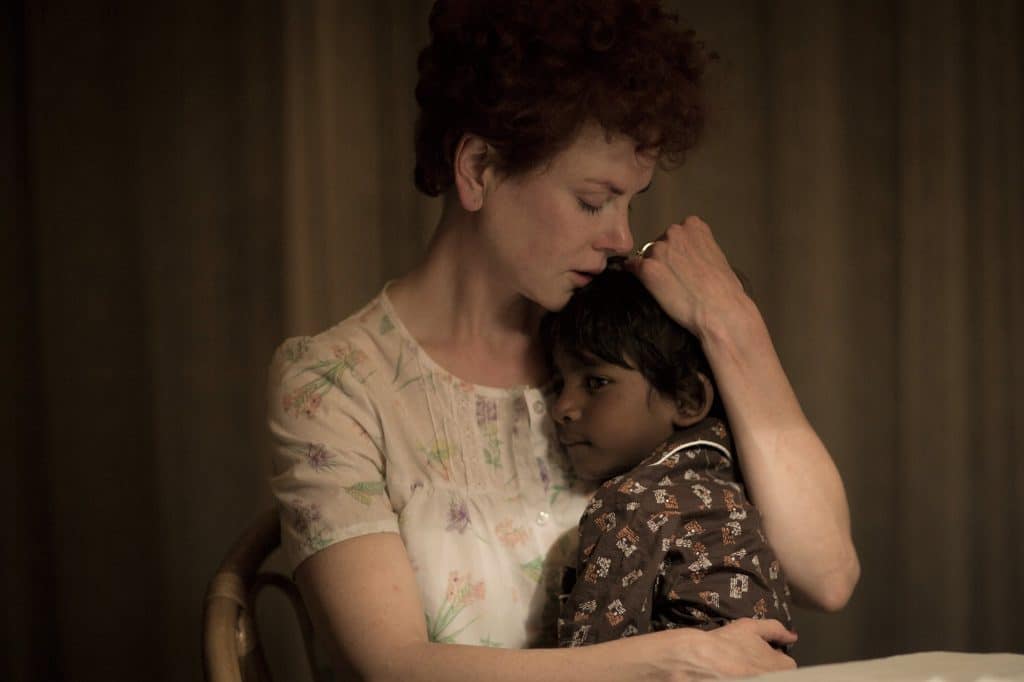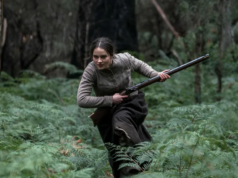Despite the extraordinary story that it tells and a great beginning, Lion is an uneven drama that makes up for its flaws with a beautiful ending
Lion (2016)
Directed by Garth Davis. Screenplay by Luke Davis, based on “A Long Way Home” by Saroo Brierley and Larry Buttrose. Starring Sunny Pawar, Dev Patel, Rooney Mara, Nicole Kidman, David Whenham, Abhishek Bharate, Priyanka Bose, Divian Ladwa, Keshav Jadhav, Deepti Naval, Tannishtha Chatterjee and Nawazuddin Siddiqui.
Lion is a decent but irregular film about an extraordinary real story. Based on Saroo Brierley’s memoir A Long Way Home (ghostwritten by Larry Buttrose), it has the perfect material for a timeless classic, yet even so, after a strong first hour, it unfortunately becomes lost, exposing its glaring lack of enough substance to fill two hours. I know it must be a challenge to retrace and depict the character’s real-life steps which basically consisted of internet research on Google Earth — something that, let’s be honest, is not exactly visually compelling. But in an attempt to create an artificial conflict, Lion nearly collapses before reaching an emotive ending that will simply make most people forget the drag that came right before.
Directed by Garth Davis (in his feature debut), the film recounts Saroo’s life since he was five years old in 1986, living with his mother Kamla (Priyanka Bose), his older brother Guddu (Abhishek Bharate) and his little sister in Khandwa, India. Back then, Kamla worked carrying rocks while Guddu and Saroo liked to sneak into (and jump off) freight trains to steal coal and trade for milk. One day, Guddu is leaving for a week to work lifting bales of hay in another city, and Saroo asks him to take him along. Guddu agrees, but an unfortunate incident traps Saroo on a moving passenger train that ends up about 1600 miles away in the city of Calcutta, where he is forced to survive on his own and try to find a way back home.
If a brief synopsis like this makes the story sound commonplace, it is everything but that. In fact, it is so unbelievable (the way only real stories are) that I prefer not to give away any more details (if you don’t know them already). The film’s first hour is by far the best, showing the sad poverty in which Saroo’s family lives and the sweet affection the two brothers have for each other. After Saroo gets lost, Davis evokes with great sensibility the nerve-racking despair of a child alone in the middle of urban chaos and human indifference, exhibiting an impressive control of his narrative through mostly powerful images and with a wonderful score by Dustin O’Halloran and Hauschka that uses a lot of dissonant sounds.
As Saroo, Sunny Pawar delivers a remarkable performance, making us share the character’s terror, sadness and even cleverness, like when Saroo realizes that someone who appears to be helping him may not be trustworthy at all. In this sense, it is nice to observe how Lion eschews the temptation of showing everyone who runs across him as one-dimensionally evil. So even if we meet a cartoonish policeman who tries to kidnap him or an unreliable woman who wants to sell him to a pedophile, there are also those who help him for no ulterior motives, like a man who takes him to the police or a woman who finds a family to adopt him — and Davis does a solid job to portray in an always fluid manner all that happens to Saroo along many years.
But then the film jumps 20 years ahead, and everything changes (for the worst). Now, if you don’t want to read about anything that is introduced at this point of the narrative, just skip right to the last paragraph. Played by Dev Patel, Saroo is now a grown-up man who lives in Australia with an adoptive family and seems to have forgotten about his past. After those memories come rushing back to him, the film decides that it should create conflict at any cost, and so Saroo becomes an aggressive jerk towards his brother, quits his job, refuses to see his adoptive parents again and treats his girlfriend Lucy (Rooney Mara) in the worst way possible because she doesn’t fucking know what it is like how every day his real brother screams his name. Really.
Mara, by the way, is completely wasted in a useless role. Not based on any real-life character, Lucy has one function and one function only: to be a romantic interest for the conflicted hero. She doesn’t seem to have any personality of her own and after uttering an unbelievable “I’ll be here,” she simply vanishes and is never seen again. Nicole Kidman, on the other hand, plays the most fascinating character in the entire film, Saroo’s adoptive mother Sue Brierley, who she embodies as a strong woman guided by faith and conviction to give so much love to those troubled children — and the scene in which Sue confides her true motivations to Saroo is a touching moment that impresses for Kidman’s sensitive performance.
Running the risk of looking like an unabashed advertisement for Google (which it actually does at a certain point) and sometimes giving in to silly clichés like visions and hallucinations, Lion makes up for its flaws with a profoundly moving ending that will probably bring a torrent of tears to the eyes of most viewers. It is indeed beautiful and offers the sort of catharsis that can be irresistible for those who like big emotions. But it shouldn’t keep us from realizing that it doesn’t do full justice to the incredible real story it tells.





